Royal Air Force Episkopi first came into being some eighteen years ago and
sadly, is now due finally to close on the 15th September this year.
This is one brief chapter on the Station's history - the period of the Cyprus
Coup d'etat and the ensuing emergency in 1974. I hope that it will serve as a worthwhile memento to all those who served here during that period and
also to their forerunners who laid the plans and the foundations of high morale which helped us through those troubled but stirring times.
I, for one, shall always remember with pride the cheerful zealous and selfless way in which serving personnel, civilians, wives and dependents alike combined their prodigious efforts to overcome every besetting problem and contingency throughout this final phase in the Station's history.
FAMILY LIFE IN THE WSBA PRIOR TO OPERATION HOMESTEAD
1. Prior to 'the Coup' the ensuing Turkish invasion and the subsequent withdrawals into the WSBA of living-out families, there were living on the 2 main bases of Akrotiri and Episkopi some 1,000 married families only. The majority
of families - more than 4,000 units comprising over 15,000 people - were living in the nearby town of
Limassol. They were aware, perhaps, of inter-communal and inter-factional
disputes among the local populace but were themselves mainly untouched by these contretemps and enjoyed peaceful, even
cordial, relationships with their Greek Cypriot and Turkish Cypriot neighbours. They lived, for the most part, in attractive spacious, well appointed flats and bungalows designed for the pleasant sub-tropical climate; their children attended 1 of the 6 modern and progressive service children's primary schools in the town or, - like father - commuted daily to the SBA where, at RAF Episkopi they attended the 1,500 strong and highly successful St John's comprehensive school. Mother shopped either at the large NAAFI Supermarket in town or in the wide range of local shops, markets and bazaars and, perhaps, had time for a coffee or cool drink at the pool-side of the NAAFI 'Island Club' before going home to get the family lunch.
In the afternoon it would be off to the beach to sunbathe, swim or paddle or perhaps back to the RAF Stations to ride, play golf, sub
aqua, sail, water-ski or take part in some other of the multiplicity of sports so well provided for at both bases.
2. On the bases themselves life followed a similar pattern though enhanced by married quarters set in more cultivated surroundings and closer proximity to beaches, recreational and sporting facilities and, in the case of RAF
Episkopi, the green and verdant playing-fields of Happy Valley.
AND THEN IT ALL CHANGED
At 0815 hrs on 15 July '74 the station was told of a movement that had taken place to overthrow President
Makarios. Initially, the notice boards dotted around the
Station were marked to show that Nicosia was 'out of bounds' but, as the day developed and the Coup became more widespread on the Island,
Limassol, Larnaca and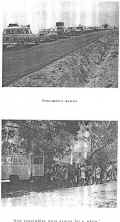 Famagusta were added. In
Limassol alone some 4,000 dependants were living families of RAF Episkopi personnel - RAF, Army and Civilian
and naturally great concern was felt for their safety. Not that they were in general danger from direct attack, but rather as
innocents caught in a spin-off action. Famagusta were added. In
Limassol alone some 4,000 dependants were living families of RAF Episkopi personnel - RAF, Army and Civilian
and naturally great concern was felt for their safety. Not that they were in general danger from direct attack, but rather as
innocents caught in a spin-off action.
At about 0930 on this same day, firing was heard around the area of the Central Police Station in Limassol and the
By-Pass was one enormous traffic jam. By mid-day, the National Guard had taken up strategic positions within the town and automatic gunfire
had increased. In one British nursery school near Polimedhia crossroads, the
wife of an Episkopi officer had her class of 70 children, under the age of 5
years, on the school floor whilst men were being killed outside. Later, with RAF Police help, she personally delivered every one
of her charges safely home to their parents.
By mid-morning the various control cells had been opened within the station and the plans 'dusted off'. In the early forenoon, the National Guard appeared on the
Ml road. Shortly afterwards, news came trickling in that about 500 armed men, not in
uniform, were moving in a variety of forms of transport from Paphos to
Limassol.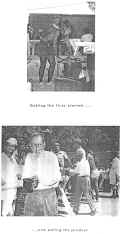 Arrangements had been made for a Service convoy to go to Limassol to take home those who wished to return to their families. The Paphos men arrived
on the Ml at the same time as the RAF Episkopi convoy and, as the risk of this convoy being caught in an armed action was extremely high, it was returned to the Station. The Paphos men moved on and one bus load of 20 men was caught in an
opposition crossfire at Kolossi crossroads and all were killed. Arrangements had been made for a Service convoy to go to Limassol to take home those who wished to return to their families. The Paphos men arrived
on the Ml at the same time as the RAF Episkopi convoy and, as the risk of this convoy being caught in an armed action was extremely high, it was returned to the Station. The Paphos men moved on and one bus load of 20 men was caught in an
opposition crossfire at Kolossi crossroads and all were killed.
"On Monday, July 15,1974 I was sitting on the wall between my house and my
neighbours, when a man with a machine-gun came dashing down the street firing
(at anything in sight). His first bullet just missed my brother's head and hit the veranda bars and rebounded on to the fence in front of my
brother. My mum literally dragged Darren and the dog over the veranda and into the house. Linda, the little girl next door, burst out crying and was dragged into the house by her mum. When the firing had stopped I, being curious, opened the slats to see if the gunman had gone. For that I was told
off and sent to my room!
Later that day Mick, a friend of ours, came round to see if we were alright - which we
were and told us that he was going to see if all the other wives around us were alright as
well. So off he went.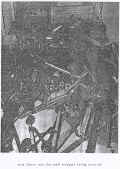
Half an hour later he was back, and told us what had happened. He had gone round to about six houses and then he had gone to a very nervous lady's house and she would not open the door and had barricaded herself in. Just then, another man with a machine-gun had come charging down the road
firing all around him. Mick had hidden behind the veranda doors then came. home.
It was a very eventful day."
Renata Frosdick
Form 3A2
St John's School
As the evening and night progressed, the fighting in Limassol increased in intensity. Women and children separated from their husbands settled down for a night of fear and came through it with heads held high.
At Episkopi 80% of the local messing staff were missing from work and, in consequence,
the Officers' and Sergeants' Messes closed and centralised messing took over. In fact, nearly all sections were equally badly hit for manpower and 12 hour shift systems became the order of the day.
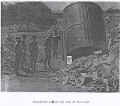
Throughout that night firing in Limassol could be heard as far away as RAF Episkopi and the night sky revealed heavy action with high caliber tracer bullets on the eastern side o£
Limassol.
July 16th lifted its head from its pillow and so did the SMO - called out to treat the remnants of the fighting 500 from Paphos many of them badly injured in fighting and now returning to their homes. In marked contrast to the proud and
belligerent mood in which they had set off from Paphos and gone through RAF
Episkopi; they returned in a sad dejected state.
This second day, the 16th July, saw very heavy fighting around Unicorn House between 0400 and 0600 hours. Unicorn House had been manned by its staff continuously since the previous day and despite the shells falling around them their spirits were high.
Union Jacks abounded as car stickers were issued for display on private and service vehicles and a sporty line in Union flags graced service vehicles leaving the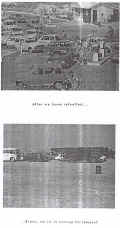 SBA. The shortage of staff in the central mess continued at an alarming rate, and to add to the difficulties there was a total power failure and stand-by generators were hastily called up to allow the eggs and bacon to flow.
SBA. The shortage of staff in the central mess continued at an alarming rate, and to add to the difficulties there was a total power failure and stand-by generators were hastily called up to allow the eggs and bacon to flow.
At teatime, a heavy concentration o£ National Guards men with heavy field
pieces was sighted on the Ml. They blocked the western end of the M1 unti1 cleared by the RAF Police (unarmed, and with
faces as white as their hat covers). They then moved through the SBA towards
Paphos, no doubt to engage the town which was predominately pro-President
Makarios. It was noted that they moved very slowly and warily through the SBA and, when
inside the confines of Episkopi, became models of military conduct; silent,
helmets on, sitting erect and looking to the front as they passed the Station Commander who took some salutes and 'inspected' them.
And so the battle raged throughout the Island from 16th into 17th July, when a lull was reached. Shortly before 9am
part of the National Guard convoy returned from Paphos and, during the afternoon, a convoy was eventually formed, returning personnel to their homes and families in
Limassol. During this period there was a great deal of 'to-ing and fro-ing' between
some Command Staffs and the authorities in Limassol but overall, an uneasy peace was in the air.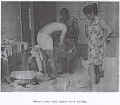
Meanwhile, at RAF Troodos, quite a number of persons were marooned at the leave centre. Some
were on holiday, some had driven to the mountain for a picnic the previous Sunday and others had been in the neighbourhood and had sought sanctuary. An Episkopi convoy vas sent up on 18 July to re-stock the diminishing supplies and, much to the relief of the catering officer at
Episkopi., his own stocks were replenished by a convoy from Dhekelia.
The next day at mid-morning, another convoy was mounted from Episkopi to
Troodos, staying overnight - but more of that later.
During the evening (19th) the remainder o£ the National Guard convoy passed
through the station, returning to Limassol from Paphos ..
With what proved to be remarkable foresight, the station exercised its Limassol sector wardens' scheme during the day. Each part of Limassol had a designated warden who was responsible for all service families living in his area. It was his responsibility to pass on directions from Unicorn House to
'his' families in time of trouble. At Unicorn House (the central families office in
Limassol) the Station Defence Liaison officer controlled the plans laid down for
emergencies by the Station. Radio contact existed between the centre and each warden. So, the plan laid down
for emergencies was put through the mill.
'With foresight' is correct, because early on the next day, Saturday 20th July, the Turkish mainland army
invaded the north of Cyprus. For Episkopi families it was to prove a long, hot, dusty day with temperatures hitting the 106 F mark and potential danger everywhere.
At 0330 hrs, service families n the village of Platres (which housed the hirings of
RAF Troodos families) were awakened and told to pack one suitcase each and get onto coaches and lorries outside. In most cases their husbands were away from home on duty and, as a refinement, these ladies were allowed five minutes to do this. From there, they were taken to RAF Troodos and brought to Episkopi under RAF Police escort from
Episkopi. Together with them were all non-resident people remaining at Troodos - some 200 cars and 25 service vehicles. This convoy had to pass through numerous road blocks manned by armed irregulars and, on the way, picked up a young British
wife almost ready to begin labour, her doctor, and a busload of Jews on holiday on the Island.
At the same time, the order was given to evacuate British families from
Limassol, the plan calling for total
withdrawal within,6 hours. In the event the town was totally cleared in nine
hours. The practiced sector warden plan swung into action. Fighting broke out between the Greek and Turkish factions
in the town and, at one time, 400 British personnel sheltered in Unicorn House and another 200 in a service Youth Club opposite. Bulletins were put out by BFBS to families and they all acted with great courage and fortitude. All service
men were recalled to work and, shortly after noon, the first families arrived at the top car park/parade ground in Episkopi for documentation and allocation to married quarters within
the Station. The withdrawal plan had never been exercised n the past except as a paper exercise and it was very soon evident that the sheer volume of people would make an adjustment necessary. The need to account for every person, to check that no-one was missing or left behind, was clear
enough but, set
in an environment of tiredness, anxiety and the ever-scorching sun on this hottest day of 1974 it was obvious that the first need was to settle evacuees in accommodation on the station.
The caterers, as ever, rose to the occasion of this day. One thousand gallons of orange and lemon squash were produced and the
Mess was open continuously for meals from 0530 to 0130 hrs the next morning. Altogether,
3,000 vehicles (Service and private) went through the control, and their occupants checked out. This represented a Limassol Service - and - sponsored population of 14,000 plus 1,000 foreign and British tourists stranded n the town.
"I decided to go home and give my mum a hand as she was going to be very busy.
My dad was unable to help - he was in England. At last, after some waiting, one family arrived. and after that the
house began to fill up until we could hardly move. We have a three bed-roomed house and we were to accommodate twenty
people, including ourselves. The women all did their best to help in the house and through the day they used to take their children out so that my mum could try and clean the house as best she could. 'With my dad being away my mum became very nervous as she wanted to do much more than she could manage. My brother and I
babysat for all the children so that my mum and the other women could have a night out and enjoy themselves.
My dad arrived back from England but we hardly saw him because he is in the
Regiment and had to sleep on the bondu at night.
The troubles did not affect us nearly as much as the Limassol people. They had the horrifying experience of leaving their homes and just grabbing
a few things that they would need.
A friend of ours went back to his house and found his food gone and a crate of beer emptied! He found a note reading: .Sorry to use your home
in this way. 'We hope the money will pay for the goods. From: The National
Guard". I found this hard to believe but it was perfectly true.
Carolyn Boyle Form 4.1
St John's School
In Limassol, the SDLO was turning the key in Unicorn House front door, before returning to Episkopi Control Room, when an excited National Guardsman ran up explaining that one family was left
behind. He sent his car round and found one young Corporal's wife with two small children. She explained that she had heard the broadcast, packed her bags and then gone to sleep for the rest of the day.......
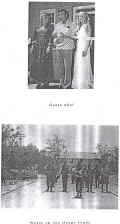
At St John's school, a second reception centre was set up for people on the island who had valid cause to be airlifted to the United Kingdom. This centre should have had both Solomon and Job as co-directors as many Cypriots were (and
are) British passport holders. The suggested directors could, perhaps, have themselves been foxed by this sample problem:
"A lady arrived in an agitated state claiming to be a Portuguese passport
holder, but the document was lost. Her husband was allegedly Maltese but his
location was unknown. She had two children, born in Cyprus 'but with UK passports. She
refused to go any where until her husband was found."
Many of the people directed to St John's School were in a poor state medically
and a small medical centre was set up by a serving officer's wife. Distraught at having
lost all their possessions, they needed sympathetic and patient handling and this they got in good measure from the staff. The first of this category of persons was processed and on the way to
UK ear1y the next day. As with others on the station, the reception centre staff worked
long, hot hours and were hampered in that only one third of the teachers were
available on the station, the remainder being on UK Summer leave and unable to return at this time.
During the afternoon, fighting broke out in the surrounding villages
between Turks and Greeks and the immediate result was a third category of refugees
Cypriot Nationals seeking sanctuary within the SBA. The Greek problem was a very
small and, after a few days the one hundred or so accommodated on Curium Beach had
left the area. The Turks presented a very different problem. Avoiding the main roads, they entered the SBA over the
hills and, by early evening 1,200 of them were concentrated around Dodge City. It being too
early to pitch a tented camp for them that evening, the Station Commander
allowed them to shelter for the night in the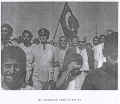 Astra Cinema. Originally the plan had been to site the camp at Evdhimou Beach but its location in relation to
the SBA boundary caused a switch of plan to set up the camp in Happy Valley. Astra Cinema. Originally the plan had been to site the camp at Evdhimou Beach but its location in relation to
the SBA boundary caused a switch of plan to set up the camp in Happy Valley.
So, the. hottest day of 1974 in Cyprus drew to a dusty, weary end. But not for the station staff, we
continued throughout the night planning for the morrow. Equally busy, but in
Limassol, were the men of HQ P&SS who had directed traffic, monitored and escorted the evacuees, often under fire, throughout the day. One evacuee reported seeing a RAF
Policeman, under fire ta crossroads, directing traffic on his knees whilst bullets moved around him.
An eventful day!
Sunday 21st July started with two main events. In the north of the island, the Turkish army was
still consolidating its ground, landing reinforcements and advancing to its first
line. The second was an army of Episkopi housewives trying to solve the problem of how to feed up to thirty persons breakfast
in a house normally used to having only four bowls of snap, crackle and
pop!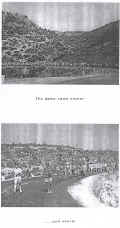
Children, as do children the world over, had forgotten the terror of yesterday. Today was an adventure,
exploring gardens and the new street, trying out someone else's toys and meeting new faces. At St John's reception centre 700 persons were being taken by bus for breakfast. In the
medical centre, the SMO had set his plans to deal with the population explosion and the church
hall was opened as an annex to the SMC. This day was to be another hot one for the valiant cooks. A temperature of 104 F, continuous meals from 0500 to
0200 hrs and 27,000 meals served by a skeleton staff caused more than one cook to trim his own waistline by a pound or two.
Voluntary help in the plate wash and dining area was given by Episkopi wives and
school children, who coped not only with the problems of their houses full of evacuees but gave hours and hours of their 'spare' time to keeping plates washed and tables and floors clean for the full 24.hours n the Central
Mess. Many a shift worker arrived home to find his wife working for the Station and not his family. The sons and
staff of the Station sutler, M Shahab Din, helped in the vegetable preparation room.
It began to dawn in another way too. Thanks to the efforts of the controllers at Unicorn House, sector wardens, HQ P&SS Polimedhia staff and, of course, the
families themselves, not one person had been hurt during the evacuation. Many frightened, but none hurt in any way.
For the Turkish refugees, it was a different story. After a night of anxiety, they were increasing
in numbers hourly. Patrols from the Royal Scots and the RAF Police were out in the bondu at the edges of the SBA picking up more Turks walking
into the SBA from outlying villages. Poorly clad, exhausted from overnight walking over difficult terrain, thirsty and afraid, they were picked up, disarmed, watered from urns of
cold water carried in patrol vehicles and brought into the station. This story, given by a policeman, is typical: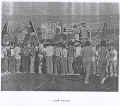
"...and then, at about 1350 hours I saw a child about four years of age entering the SBA over the hills from the direction of Kandu (10 miles) leading a blind old woman of 60 years or more. She had torn
slippers on her feet, the child was barefoot, his feet bleeding. Both were exhausted and were treated at the SMC "
So the day dawned, 1st August 1974. Mothers had been awake since dawn; cars packed, children fed; champing at the bit and
wanting to see how the record player had fared in Limassol since they had left.
Almost 1,000 vehicles were used to take families back to their homes; the operation stagemanaged by SDLO at Unicorn House under the control of RAF
Episkopi Operations Room, the convoys escorted by Episkopi RAF Police and monitored from the town boundaries by HQ P&SS.
It may be worthy of note, at this stage, that the Station Commander, who had taken up his appointment literally a few days before the start of the 'Coup' saw Limassol hirings and Berengaria quarters for the first time by
joining the second convoy to return on 2 August 1974.
So, by the evening of 2 August, all Limassol-ites were back at home. Most had their houses intact. Some had the results of war staring bleakly at them as they opened their front doors: shell holes in the walls, scattered possessions and general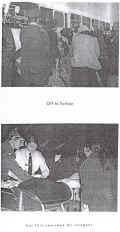 mischief. But, as ever, it was the wives who had to set to and "spread the rushes anew". Refrigerators and deep freezers had been switched off during power failures and the contents rotted and smelling (no time to take them on the evacuation); rubbish to be swept out and personal things straightened. A hardy breed is the serviceman's wife! But not only were servicemen so confronted. Equally were teachers, DOE personnel, Meteorological families - everyone who had been taken out of Limassol in those frenetic few hours. Life resumed anew! mischief. But, as ever, it was the wives who had to set to and "spread the rushes anew". Refrigerators and deep freezers had been switched off during power failures and the contents rotted and smelling (no time to take them on the evacuation); rubbish to be swept out and personal things straightened. A hardy breed is the serviceman's wife! But not only were servicemen so confronted. Equally were teachers, DOE personnel, Meteorological families - everyone who had been taken out of Limassol in those frenetic few hours. Life resumed anew!
The next day, the locally employed mess staff, now camped in Happy Valley were returned to their tents. The cause
three reported cases of Bacillary Dysentery. Not too much of a risk, one might add, but
symptomatic of the care and attention to detail taken by the SMO and his staff. In consequence, the volunteer British workers in the Mess were now put onto a paid duty - at £1,500 mils per six-hour shift.
And hard work at that.
Realising that Happy Valley could not sustain the effort of housing so many refugees over a long period, plans had been laid some weeks before for a custom-built camp to be erected at Paramali Station, some 2-3 miles away. On 3 August, the refugee peak in the Valley
had reached 5,698 persons and, on 5 August, 1,500 refugees were moved into the new camp. Careful consideration had gone into 'who should go' and selected villages were moved. The new camp had
shower and cooking facilities in addition to field lavatories, a medical centre, tannoy system and police control point. The medical services at the new camp were provided by No
19 Ambulance Unit until 15 August when the SMC staff took over. On 9 August, more ex-UK help was provided in the form of the 'Save the Children Organisation' which provided a medical team of one doctor and two nurses. The doctor and one nurse left in mid-August to work in the Greek refugee camp
in the eastern SBA.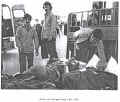
All was now back to an uneasy normal (?) state. Families had settled back into their
homes and, within reason, life was good again.
It was too good to last! The Geneva peace talks were brought to an abrupt end and on 14 August, (to cut a long story short) a second evacuation from
Limassol was mounted. On this occasion, people were told to return to the same houses they had evacuated some fortnight earlier. The evacuation
was completed by mid-day and this represented a fantastic move by the families inside four hours. Credit to
'the plan', the RAF Episkopi wardens and, of course, the families themselves. It was noticeable that the
'exhilaration'of the first evacuation was followed by a
sense of weariness during the second. The Turkish Army had continued its
advances and now occupied a line roughly East to West across the centre of Cyprus.
On 15 August the decision was taken to evacuate to the UK the families of personnel who had been living in the Republic - that is, all except those living in Married Quarters within the
SBAs. A massive airlift was mounted and many harrowing
scenes unfolded as families were moved at less than an hour's notice - often the husband on duty and not capable of leaving his post. This particularly applied to
the stalwart Royal Scots out manning OP's or in the bondu. Many a damp eye appeared over the next few days in the
SWO's car park as bus load after bus load of wives and children left to quote the song in
"Paint your Wagon", "Where are we going, Idon't know, who's gonner be there - I ain't certain, all I know is - I'm on my
way". And it was many days in some cases, before husbands knew where their families had been settled in UK.
But one outstanding matter remained of vital personal importance to families who had been living in the Republic.
This was quite simply, that during the evacuation they had, perforce, left all their belongings behind except for those
in the one suitcase allowed to them in the withdrawals to the SBA. One estimate was made that approximately four million pounds worth of personal belongings had been left behind, ranging from hi-fi stereos to framed paintings,
washing machines, sewing machines and normal family possessions. After agreement with the Republican authorities and, following a sweep of Limassol by the RAF Sector Wardens, heads of families were allowed to return to the town. Unicorn
House, with the SDLO in charge, controlled the return (or 'Operation SNATCH', as
it was named) aided by his ever-willing sector wardens and backed up by a company of Royal Marine Commandos. In all, 40,000 packing crates were used. This meant the radio-linked wardens calling up for lorries once a load had been identified. Had all
Episkopi-based residents been in Cyprus at this time,
the system would have been relatively easy to work, but remember that two-thirds of the teaching staff were on UK leave.
This meant that the schools had to send teams of teachers to pack up the belongings of their absent colleagues as did other organisations. As ever, helpers were
needed and SDLO reports one story illustrating the esprit-de-corps of
servicemen at the time: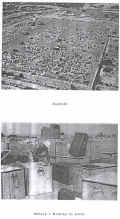
"Mid morning of the first day of 'SNATCH', the Marines' company sergeant major and two of his staff came to see
me in Unicorn House. They asked to help and I told them that I needed Indians, not chiefs! Without hesitation, the CSM unbuckled his wrist badge of rank and the sergeants their chevron sleeves and said "Right, today we're Indians- and spent the rest of the day hauling crates onto lorries."
Such was the effort made that the town was cleared of personal possessions by noon on the third day, Monday 19th August. Meanwhile. from mid-morning of the first day, 17th
August, the lorries began to roll up at the parade ground. To avoid 40,000 crates being jumbled together, the RAF Police marked out the area into Sectors to allow more speedy recognition later on. They
also had to unload the vehicles on the first two days since everyone else who could have helped was down in
Limassol. The MT drivers worked themselves to a near standstill. They loaded in
Limassol, drove to Episkopi, unloaded and returned to town, time and time again. Eventually, mechanical
loaders were brought to the site and operated by 112 Sqn personnel. There had been no time to pack the crates properly
in the town and so, from 19 August onwards, they were re-packed on the square by their owners, documented by the Supply Staff, banded, addressed and restacked. Contract ships were arranged and the Supply
Staff sent off the boxes to UK.
It says much for the spirit and phlegm of personnel on the station that they threw away their personal grief and problems in such difficult
circumstances and buckled down to the task of getting on with the Job. Entertainment
was stepped up. For many, the existing station facilities of Theatre, Photographic Club, Kart Club, and the like were enough to occupy off-duty time.
But, for others, an entertainments committee was set up to pack the Station, almost
daily,with 'something to do'. This spectrum of entertainment went from a Donkey Derby through a moonlight concert to Mr Frankie Howard, the first and perhaps best - public entertainer to give his time and energies to the
weary Episkopi residents.
So, for British personnel, the year passed in rumours about tour lengths, compensation claims and,
above all "Letters from Home". A sad existence of men worried about families,
who would arrange for coal deliveries in UK? how young Johnnie would react to the sudden change in parental control? et al. Many a letter from children in UK would send a hardened serviceman into a corner by himself to gulp down a lump in his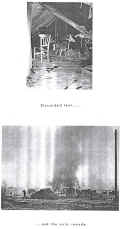 throat. But, in the end, news
came of tour lengths, re-patriation dates and confirmation that all was well
at home, and men set out to do the job and await the reunion date. throat. But, in the end, news
came of tour lengths, re-patriation dates and confirmation that all was well
at home, and men set out to do the job and await the reunion date.
All was not so well with the Turkish refugees, however. On 14 September a
second camp was opened outside Happy Valley, to be called Paramali Forest. The same facilities
were provided as at the Paramali Station camp with the addition of two PMRAFNS officers - one at each camp - to supervise baby clinics. And mention might be made of the SSAFA sister based at Episkopi who was
concerned throughout the troubles with ante and post-natal care of pregnant women. The SMO reported that, during the six months of the refugees' stay:
"there were 63 births in the TPMH RAF Akrotiri and three more born in the
SMC.
- not one child lost and a tribute to a hardworking, but seldom publicised part of our
organisation.
Naturally, the Turkish camp leaders were anxious that they should be allowed to leave the area in safety before the onset of winter. Political considerations, to be resolved thousands of miles away from the station,
would determine this. Episkopi was merely the coal-face of this particular mine. Nevertheless, the Turks took it upon themselves to assert their authority and, (usually with the
world press present) staged demonstrations ranging from 2,000 to 4,000 persons demanding
the rights of international refugees, with the attendant political repercussions, should such a status be agreed between the three governments involved - UK - Greece - Turkey. One particularly violent demonstration vas mounted during an attempted visit to the camps by President
Makarios, following which vehicles
were burnt, roads destroyed and damage caused to Married quarters.'
It was the Station Commander's wish, in conjunction with COSBAA that the front line against such demonstrations should be his unarmed police force. Only as a last resort should
the resident battalion (armed) be deployed. It is a credit to their judgement that, despite very strong provocation and personal injuries, the use of firearms was never
made. Nor was any occupant of MQ's placed in extreme danger.
On 2 October, two officers of PMRAFNS were attached to the station from UK to supervise the baby clinics and
were replaced at the end of three months hard work. Some interchange of refugees between the north and the south of the island had been arranged between governments and one of the first categories to go were doctors., So
ended the help given by the two Turkish doctors in the camps, and the RAF and Army were again left to man the two surgeries.
Altogether, there was some £30,000 spent on pills and medications in the two camps. To dwell on medical statistics for a moment, during their six-month stay, 280 Turkish refugees were admitted to
TPMH Akrotiri and 600 were seen there as out-patients.
The remainder of their possessions were removed from the camps to a central point (the top car park); tractors, buses, cars, and household goods, which still
remain under guard, awaiting a political decision on their future.
AFTERWARD
So this chapter ends and very shortly the station itself will close.
However, it will interest former members of the station to know that this July - a year after
the Coup - the station set out to raise in one month the sum o£ £1,000 for donation to Cheshire Homes. The response was magnificent - £2,000double the target
in 4 weeks. This sum will go to endow a bed at the Cheshire Homes for Mentally Handicapped Children named 'The RAF Episkopi Bed'. The name of the Station will
then live on as a reminder of the selfless spirit that saw us through a most difficult time and which was again exemplified
in the Episkopi Bed Project.
For their part in the emergency, RAF Episkopi personnel were given the following awards:
THE QUEEN's COMMENDATION FOR BRAVE CONDUCT
Corporal J Marshall
Corporal D C1eaver
MBE
Warrant Officer R Eensley
BEM
Corporal D Millsop
PERSONAL COMMENDATION OF AIR COMMANDER CYPRUS
Warrant Officer C Cotterill
Mrs S Tempest
Chief Technician K A Johnson
Sergeant A Erol (RAF Aux Police) |
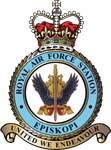
 Famagusta were added. In
Limassol alone some 4,000 dependants were living families of RAF Episkopi personnel - RAF, Army and Civilian
and naturally great concern was felt for their safety. Not that they were in general danger from direct attack, but rather as
innocents caught in a spin-off action.
Famagusta were added. In
Limassol alone some 4,000 dependants were living families of RAF Episkopi personnel - RAF, Army and Civilian
and naturally great concern was felt for their safety. Not that they were in general danger from direct attack, but rather as
innocents caught in a spin-off action. Arrangements had been made for a Service convoy to go to Limassol to take home those who wished to return to their families. The Paphos men arrived
on the Ml at the same time as the RAF Episkopi convoy and, as the risk of this convoy being caught in an armed action was extremely high, it was returned to the Station. The Paphos men moved on and one bus load of 20 men was caught in an
opposition crossfire at Kolossi crossroads and all were killed.
Arrangements had been made for a Service convoy to go to Limassol to take home those who wished to return to their families. The Paphos men arrived
on the Ml at the same time as the RAF Episkopi convoy and, as the risk of this convoy being caught in an armed action was extremely high, it was returned to the Station. The Paphos men moved on and one bus load of 20 men was caught in an
opposition crossfire at Kolossi crossroads and all were killed.